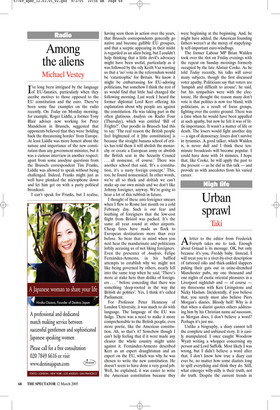Among the aliens
Michael Vestey
I’ve long been intrigued by the language of EU-fanatics, particularly when they ascribe motives to those opposed to the EU constitution and the euro. There’ve been some fine examples on the radio recently. On Today on Monday morning, for example, Roger Liddle, a former Tony Blair adviser now working for Peter Mandelson in Brussels, suggested that opponents believed that they were ‘holding back the threatening hordes’ from Europe. At least Liddle was more honest about the nature and importance of the new constitution than any government minister, but it was a curious interview in another respect: apart from some anodyne questions from the Brussels correspondent Tim Franks, Liddle was allowed to speak without being challenged. Indeed, Franks might just as well have plonked the microphone down and let him get on with a party political broadcast.
I can’t speak for Franks, but I realise, having seen them in action over the years, that Brussels correspondents generally go native and become gullible EU groupies, and that a sceptic appearing in their midst is regarded as an alien being, but I couldn’t help thinking that a little devil’s advocacy might have been useful, particularly as it was followed by the oily Keith Vaz warning us that a ‘no’ vote in the referendum would be ‘catastrophic’ for Britain. We know it might be embarrassing for EU-adoring politicians, but somehow I think the rest of us would find that little had changed the following morning. Last week I heard the former diplomat Lord Kerr offering his explanation about why people are against the constitution. He was taking part in the often glutinous Analysis on Radio Four (Thursday), which was entitled ‘Bill of Frights?’. Our poodle in Brussels had this to say: ‘The real reason the British people feel frightened of it [the constitution] is because the straight banana school of critics has told them it will abolish the monarchy or create a European army or abolish the British seat in the Security Council ... all nonsense, of course.’ There was another school that said, ‘It’s a constitution, it’s a nasty foreign concept.’ This, too, he found nonsensical. In other words, we’re all so thick and doltish we can’t make up our own minds and we don’t like Johnny foreigner, anyway. We’re going to hear a lot of this rubbish in future.
I thought of these anti-foreigner smears when I flew to Rome last month on a cold February day. Such is our fear and loathing of foreigners that the low-cost flight from Bristol was packed. It’s the same all year round at other airports. Cheap fares have made us flock to European destinations more than ever before. So bear that in mind when you next hear the mandarinate and politicians loftily accusing us of not liking foreigners. Even the presenter of Analysis, Felipe Fernández-Armesto, in his baffled attempts to establish why we might not like being governed by others, nearly fell into the same trap when he said, ‘There’s more at stake here than dislike of foreigners ... ’ before conceding that there was something ‘deep-rooted in the way the British do politics’. Yes, I think it’s called Parliament.
For Professor Peter Hennessy of London University, it was much to do with language. The language of the EU was fudge. There was a need to make it more comprehensible to the British people, even more poetic, like the American constitution. Ah, so that’s it? Somehow though I can’t help feeling that if it were made any clearer the whole country might unite against it. Fernández-Armesto described Kerr as an expert draughtsman and an expert on the EU, which was why he was chosen to write the new constitution. He doesn’t seem to have done a very good job. Well, he explained, it was easier to write the American constitution because they were beginning at the beginning. And, he might have added, the American founding fathers weren’t at the mercy of stupefyingly self-important euro-windbags.
The former Labour MP Brian Walden took over the slot on Friday evenings with the repeat on Sunday mornings formerly occupied by the late Alistair Cooke. As he told Today recently, his talks will cover many subjects, though the first discussed voter apathy. Politicians say that voters are ‘lumpish and difficult to arouse’, he said, but his sympathies were with the electorate. He thought the reason many don’t vote is that politics is now too bland, with politicians, as a result of focus groups, fighting over the centre ground. There was a time when he would have been appalled at such apathy, but now he felt it was of little importance. It wasn’t a matter of life or death. The losers would fight another day — a sign of democracy; losers don’t survive in tyrannies. A good talker, which Walden is, is never dull and I think these tenminute broadcasts will become popular. I could have done with 14 minutes. I hope that, like Cooke, he will apply the past to the present — as he did in this talk — and provide us with anecdotes from his varied career.
































































 Previous page
Previous page